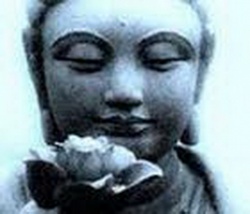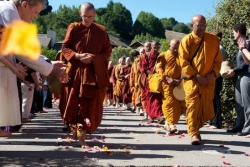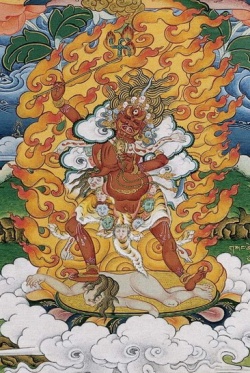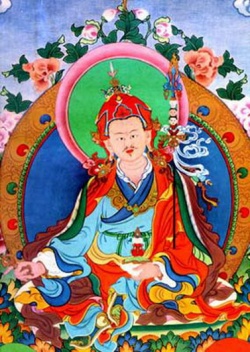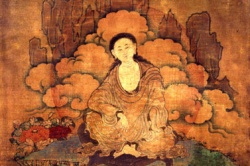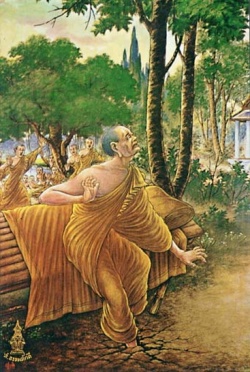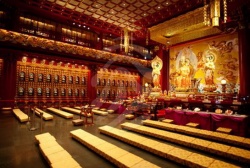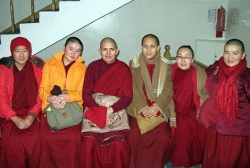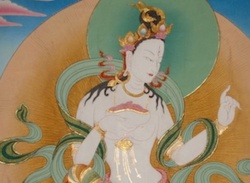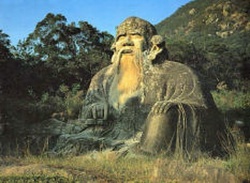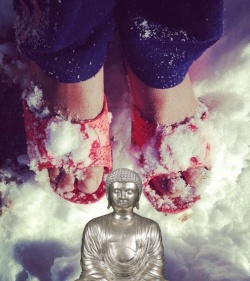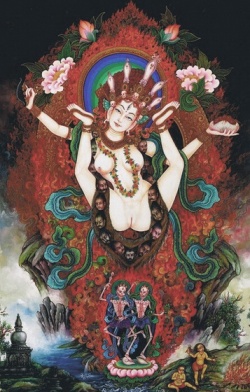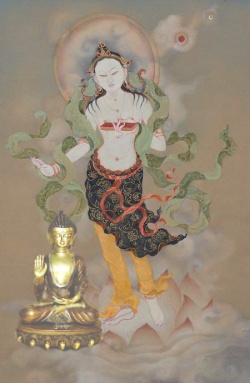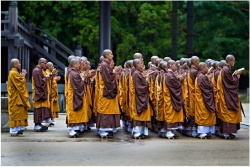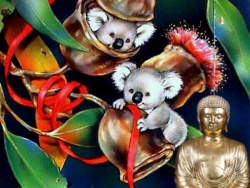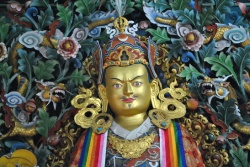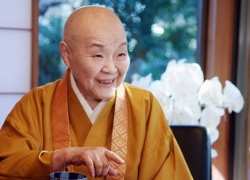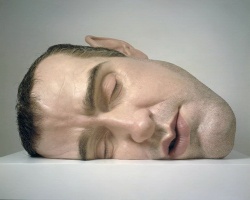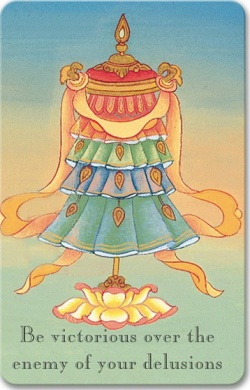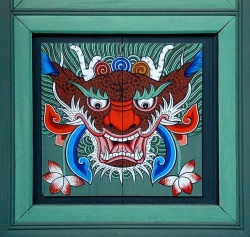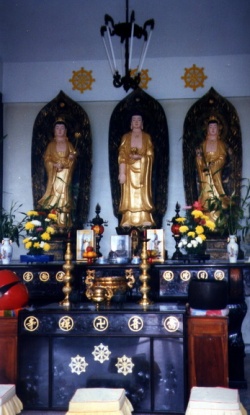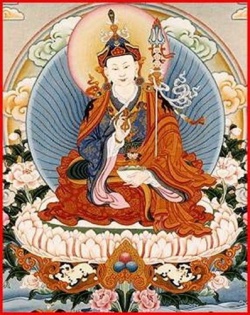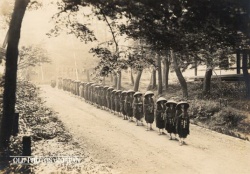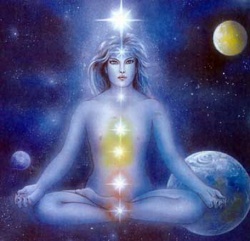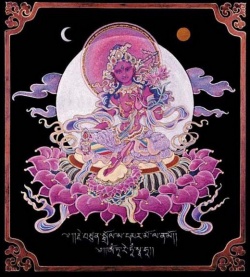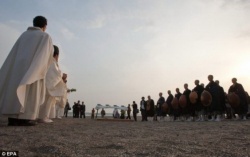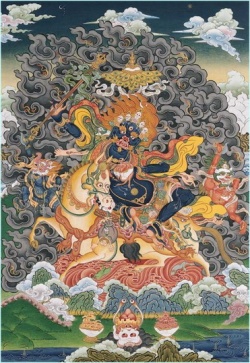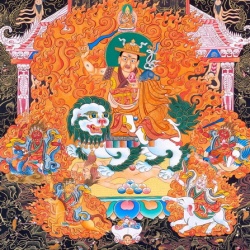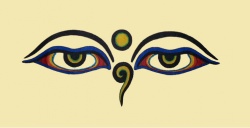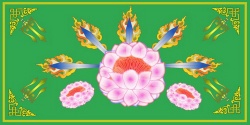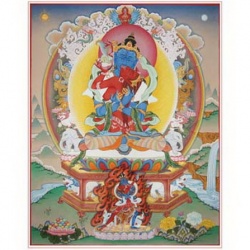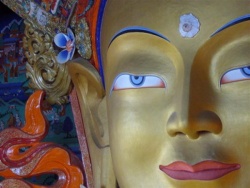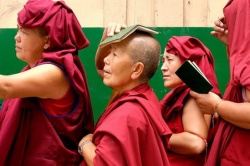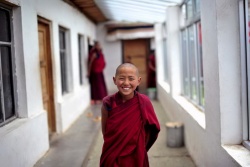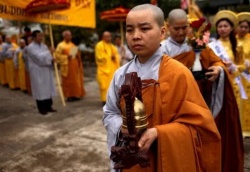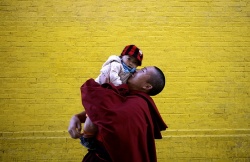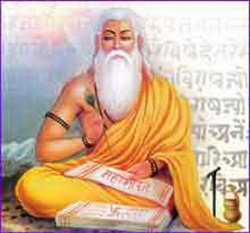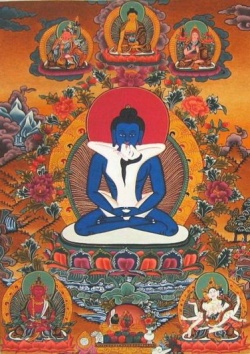The Wonderful Dharma Lotus Flower Sutra with commentary by the Venerable Master Hsuan Hua: Chapter 20: Never-Slighting Bodhisattva
The Wonderful Dharma Lotus Flower Sutra
with commentary by the Venerable Master Hsuan Hua
Chapter 20: Never-Slighting Bodhisattva
Sutra:
At that time the Buddha told the Bodhisattva Mahasattva Great Strength, “You should now know that if someone reviles, abuses, or slanders a Bhikshu, Bhikshuni, Upasaka, or Upasika who upholds the Dharma Flower Sutra, he will incur great offense retribution as described above. The meritorious virtues obtained through the eyes, ears, nose, tongue, body, and mind gained by the upholder of the Sutra are also as described above.”
Outline:
D3. Mentioning the blessings and offenses incurred through faith and slander as an exhortation to propagation.
E1. Prose.
F1. Recapitulating previous chapter's information on offenses and blessings.
Commentary:
Who is "Never Slighting?" He is a Bodhisattva. Is that his real name? No, it is actually a kind of nickname. He was given this name because he bowed to everyone he met. The arrogant Bhikshus, Bhikshunis, Upasakas, and Upasikas gave him the name "Never Slighting."
"Get a load of him," they would sneer. "That is Never-Slighting Bodhisattva!" Do not think that was his real name. Actually, Never-Slighting Bodhisattva was Shakyamuni Buddha in a former life when he was practicing the Bodhisattva Path. At that time he bowed to everyone, and arrogant people would ridicule him, "Hey! It is Never-Slighting Bodhisattva!" He would always say to people, "I do not dare slight you, because you will all become Buddhas." And so the arrogant Bhikshus called him Never-Slighting. Even though the name was given to him to make fun of him, he accepted it.
We shall now use the Four Siddhantas to explain his name:
1. Mundane Siddhanta. Inwardly, Never-Slighting Bodhisattva embraced both the attitude of never slighting anyone and the wisdom of never slighting anyone. Outwardly, he practiced the conduct of reverence. In all circumstances he was reverent and respectful. So I have written a verse:
Everything is a test,
To see what you will do;
Mistaking what is before your eyes,
You have to start anew!
Never-Slighting Bodhisattva recognized what was before his eyes, and so he took up the practice of bowing to people. That belongs to the category of mundane Siddhanta.
2. Siddhanta for the Sake of Others. He genuinely practiced the conduct of not slighting other people. That was Siddhanta for the sake of others.
3. Siddhanta as a Cure. With his mouth, he expounded the teaching of never slighting. He always said, "I do not dare slight you, because you will all become Buddhas." That was Siddhanta as a cure for arrogance and pride.
4. Siddhanta for the Sake of the Primary Principle. He always held an attitude of never slighting others. That was Siddhanta for the sake of the primary principle.
At that time, when the Buddha had finished the chapter "The Merit and Virtue of a Dharma Master" and was about to begin the chapter "Never-Slighting Bodhisattva," the Buddha told the Bodhisattva Mahasattva Great Strength. When this Bodhisattva moves his hand or takes a step, the earth quakes in six ways. As long as he stays still, nothing happens. But as soon as he moves, even just to take a single step, the world experiences six types of earthquakes. The earthquakes represent the extent of his prowess and might.
The Buddha said to him, "You should know that if someone reviles, abuses, or slanders a Bhikshu, Bhikshuni, Upasaka, or Upasika who receives, upholds, reads, recites, explains, or writes out the Dharma Flower Sutra, he will incur great offense retribution as described above"—which is a monstrous retribution. How great? As big as Mount Sumeru. The meritorious virtues obtained through the purity of the eyes, ears, nose, tongue, body, and mind gained by the upholder of the Sutra are also as described above. This is as described in the previous chapter. You should be clear that the offenses belong to the one who slanders, and the merit and virtue belong to the one who upholds the Sutra; do not misinterpret the text!
Sutra:
“Great Strength, once limitless, boundless, inconceivable asamkhyeyas of eons ago, there was a Buddha by the name of King of Awesome Sound Thus Come One, One Worthy of Offerings, One of Proper and Pervasive Knowledge, One Perfect in Clarity and Conduct, Well-Gone One, One Who Understands the World, Unsurpassed Lord, Regulating Hero, Teacher of Gods and Humans, Buddha, World Honored One.”
Outline:
F2. Illustrating retributions for faith and slander in the distant past.
G1. The origins.
H1. The first Buddha.
I1. Period of time.
I2. The Buddha's name.
Commentary:
Great Strength, once limitless, boundless, inconceivable asamkhyeyas of eons ago, there was a Buddha by the name of King of Awesome Sound. "Asamkhyeya" means "uncountable," and so to conceive of the number of eons that have transpired is beyond the power of imagination. "Awesome" means that he had great power. The sound of his voice was such that when he spoke, the three thousand great thousand world system trembled. He had an awesome voice. When he spoke the Dharma, people would on the one hand be afraid and on the other hand really want to listen. Because they were filled with awe and respect, they did not dare disobey the rules, to say nothing of falling asleep during the lectures. They did not even dare move! They would sit and listen to the Sutra lectures as if they were in samadhi, on their best behavior, no goofing around, no fidgeting or being a fussbudget, no nodding off, or any of that. Why were they so attentive? Because of the sound of this Buddha's voice. It was not like when I lecture: I lecture the Sutra, and you sleep. "What did he say? I am kind of fuzzy. It is inconceivable, whatever it was." "Inconceivable" just means you have no idea what I said, because you were sound asleep. If you had heard it, it would also be inconceivable but in a different way. But I am not Awesome-Sound, and so when I speak the Dharma, you fall asleep. If it were Awesome-Sound Buddha lecturing the Dharma, no one would dare fall asleep.
Thus Come One. Riding on the Way which is “Thus”, he “came” to attain Proper Enlightenment. One Worthy of Offerings. A Buddha is worthy of offerings from gods and humans. One of Proper and Pervasive Knowledge. There was nothing he does not know. One Perfect in Clarity and Conduct. His wisdom was full, and his cultivation was perfected. He was called Well-Gone One because he could go to the very best place. One Who Understands the World. In the whole world, he was the one with the greatest understanding. Unsurpassed Lord. No one in the world possessed more knowledge and learning than he did. Regulating Hero, Teacher of Gods and Humans, Buddha. A Buddha has perfected the three kinds of enlightenment and is replete with the myriad virtues. World Honored One. He had the Buddha's ten titles, and so he was called the World Honored One.
Sutra:
“His eon was named ‘Apart From Decay.’ His country was named ‘Great Accomplishment.’”
Outline:
I3. His eon and his country.
Commentary:
His eon was named "Apart From Decay," apart from all marks of deterioration and all unlucky circumstances.
What was the name of his country? It was not the United States, England, Italy, or Spain. His country was named "Great Accomplishment." Where was it? It was right where it was. If you want to go there, first you have to study the Buddhadharma. When you understand the Buddhadharma, you can go there. You would not have to buy a plane ticket, either.
- * * * * * * * * *
A couple held their wedding here at the Buddhist Lecture Hall today. I remember when my disciple Guo Rong had his wedding here, it nearly influenced one of my left-home disciples to return to lay life. Today maybe there are some lay disciples who will be influenced to leave the home-life. Why? That is an inconceivable state, but it is not too hard to figure out. There is another kind of state, which is that the single men and women will start getting anxious. Either they will think “I should hurry up and do this, too,” or else they will think, “I do not want to do that. I am going to take my time.” There are many different kinds of influences and situations. These are causes planted during the “limitless, boundless asamkhyeyas of eons” mentioned earlier in the Sutra, and they have come to fruition today. These are inconceivable causes and inconceivable fruits. But my telling you this is the same as not telling you.
You should not think there is really some inconceivable state here. Actually it is all very simple, but there were a few flaws. The parents of the bride had their seats, but there was no place for the parents of the groom to sit. That made it seem like the Buddhist Lecture Hall was not being fair. It also made you American monks and nuns look irresponsible and sloppy in the way you do things. I did not know who all the people were, but you all should have known and you did not. I think maybe the parents of the groom were a little upset about not being treated equally. In the future you should pay more attention to these matters. They may be details, but they make a big difference. If we had treated them equally, I am sure they would have been very happy. Some people are thinking, “It is not only the American monks and nuns who were irresponsible, the laypeople were also to blame. The laypeople should also take part of the responsibility for the things that were done wrong.”
Sutra:
“In that world, the Buddha King of Awesome Sound spoke the Dharma for the gods, humans, and asuras. To those who sought to be Hearers, he spoke the Dharma of the Four Truths to take them across birth, old age, sickness, and death to ultimate Nirvana. To those who sought to be Pratyekabuddhas, he spoke the Dharma of the Twelve Causes and Conditions. For the Bodhisattvas, in order to lead them to anuttarasamyaksambodhi, he spoke the Dharma of the Six Paramitas, which culminates in Buddha-wisdom.”
Outline:
I4. Speaking the Dharma.
Commentary:
In the eon Apart from Decay, in the country called "Great Accomplishment," in that world the Buddha King of Awesome Sound spoke the Dharma for the gods, humans, and asuras. He taught the gods to cultivate the five precepts and the ten good deeds. He taught the asuras to cultivate precepts, samadhi, and wisdom and to put to rest greed, hatred, and stupidity. He did that because asuras do not keep the precepts or cultivate samadhi or wisdom. All they do is indulge in greed, hatred, and stupidity. These three poisons dominate all of their thoughts. They love to indulge in hating and in getting angry. They get greedy for something and then, if they cannot have it, they get mad. Once they get mad, they become foolhardy. Then they go around picking fights with people.
Why are the asuras greedy? Because they are never satisfied. If they do not have something they want, they scheme to get it. Once they've got it, they are afraid they are going to lose it. If they do not get it, they have afflictions. If they do get it, they also have afflictions. Either way, it is trouble, and so they are angry all day long. No matter what happens, they get angry. Once they get angry, they lose their wisdom, and as a result they lose their samadhi and their precepts. For the asuras, then, the Buddha King of Awesome Sound speaks the Dharma, saying, "Cultivate precepts, samadhi and wisdom. Put to rest greed, hatred, and stupidity."
Asuras are those who love to fight. "Asura" is Sanskrit and means "ugly." They are deformed and hideous. Their facial features are all pushed together in their face. This is not the interpenetration of the six sense faculties, either. With the interpenetration of the six faculties, one's eyes can hear, one's ears can see, and so forth. Each faculty has the functions of all six. That ability is gained through cultivation. The asuras' eyes, ears, nose, and tongue are all pushed together into one place. For example, their eyes might be below their nose or their mouths might be in between their nose and eyes. They are so twisted and deformed that you can hardly call them eyes, ears, noses, or mouths.
Asuras are unreasonable, too. When they were people, they always glared and knitted their eyebrows together so that they stood up vertically instead of spreading across horizontally. Then, when they turned into asuras, their facial features all got lumped together. Their appearance is very ugly, and their minds are also ugly. Their hearts are not at all proper or kind. Rotten thoughts run through their hearts all day long. They are always trying to ruin everything. The one they dislike the most is the Jade Emperor—Lord God. When they see him, they are overcome with fits of jealousy. Asuras fight, scold, beat, and kill people all day long. People you see on the street who yell at others, beat, or even kill people—they are all asuras. Thieves are yin asuras; soldiers are yang asuras.
To those who sought to be Hearers, he spoke the Dharma of the Four Truths. What are the Four Truths? They are: suffering, accumulation, extinction, and the Way. Hearers are one of the Two Vehicles. The Two Vehicles are also called the Small Vehicle, because they are satisfied with small accomplishments. They do not care to go forward and seek the Great Vehicle. They obtain certification to the first, second, third, or fourth stage of Arhatship and think that they have finished their work in the Way. They think they do not need to undergo further existence on the wheel of suffering, the wheel of birth and death, and so they do not go forward to seek the Buddha Way. We say that, "Above, they do not pursue the Buddha Way, and below, they do not save living beings." They say, "Why do I need to save living beings? Save yourself! Save your own living beings within yourself." Because they awoke to the Path when they heard the sound of the Buddha's voice, they are called Hearers.
The Buddha taught them the Four Holy Truths, the first of which is suffering. How many kinds of suffering are there? There are limitless sufferings. We also speak of three sufferings and eight sufferings. These are just general categories, however. In reality, there are infinite varieties of suffering. You could never count them all.
"But where does suffering come from?"
Suffering comes from happiness.
"Where does happiness come from?"
Happiness comes from suffering. Without suffering, there is no happiness; without happiness, there is no suffering. So I often say,
To endure suffering is to end suffering.
To enjoy blessings is to diminish one's blessings.
What are the three sufferings? They are:
1. The suffering within suffering
2. The suffering of decay
3. The suffering of process
The first is the suffering within suffering. Originally, let us say someone is poor, but then on top of that he has no home to live in, no food to eat, and no clothes to wear. That is suffering added on to suffering.
"Poor people might suffer, but rich people do not!" you might say.
No, wealthy people also suffer. There is the suffering of decay when you lose what you had. Say, for example, a forest fire roars through an area of exclusive housing in a canyon and burns it to the ground. These people were not suffering from poverty by any means, but now they are poor. That is the suffering of blessings and honor gone bad.
"There is suffering in being poor and in being wealthy. Well, I am neither one, so I am not suffering, right?" you say.
You must also undergo the suffering of process. From a child you grow to be an adult; from adulthood you move onto old age. And you do not quite know how it happened. In thought after thought, there is change and decay. It never stops, like the waves on the sea. Moment by moment, day by day, month by month, year by year, the process continues. There is no way you can stop it. Birth, dwelling, change, and extinction continue ceaselessly. That is the suffering of process—the process of continual change. I can only speak of them in general. I'd never finish if I speak of them in detail.
There are also eight kinds of sufferings:
1. Birth. When people are born, it is like ripping the shell from a live turtle. It hurts! That is why children cry when they are born, they know it is suffering.
2. Old age. Old people know what it is like. Young people have no way of knowing, and they do not understand when you try to tell them. Once they get old and their eyes, ears, and teeth all quit on them, their legs and hands go on strike, then they know. Would you say that was suffering or not? You try to take a walk, and your legs would not move. You try to read something: "Hey, eyes, help me out here!" but your eyes say, "I am too tired." Your ears fall in with your eyes and go deaf. Then your teeth fall out. Your hands shake, so you cannot write. Would you say that was suffering or not? Why does that happen? Because you did not cultivate. The suffering of old age is very democratic; everyone must undergo it.
3. Sickness. Sickness is also very democratic: Everyone gets sick, even the emperor. When the president gets sick, he has to go to the doctor or the hospital. You can be a king or a minister, or any other person of high position, but if you get sick you are going to suffer. Chinese people take herbal medicines, and that is bitter, too. Most people have experienced the suffering of sickness. What everyone has not yet experienced is the suffering of death.
4. Death. Death is like ripping the skin off a live cow: Do you think that hurts or not? It is just as painful when the time comes to die and the four elements return to their source. Can you imagine the cries of a cow if you tried to flay it alive? That is about how much it hurts to die.
5. The suffering of being separated from what you love. This is the fiercest of all. Say you love someone, and because of some special circumstance, that person has to leave you. Perhaps he goes into the army or off on business. Then you really suffer. It is painful but unavoidable.
6. The suffering of being joined with what you hate. You keep running into the very person you just cannot stand. That is very painful, too.
7. The suffering of not getting what you want. You may have hopes and wishes, but somehow you never fulfill them. This is the suffering of not getting what you want. A man might want to find a good wife, or a woman might want to find a good husband, but it is not easy. Perhaps you get to be thirty, forty, or fifty years old, and you still do not find anyone. What misery! Then you feel you have wasted your whole life. In general, not getting what you want is suffering.
"I am not concerned with birth, old age, sickness, or death," you say, "and I do not love or hate anyone. I do not wish for anything. I do not suffer, do I?" you ask.
Hah! Who would have guessed that right within you, the five skandhas are raging. This is:
8. The suffering of the raging blaze of the five skandhas. Form, feeling, thinking, formations, and consciousness—the five skandhas—turn you upside down, and they rage incessantly like a huge conflagration.
Those are the eight sufferings. I would like to lecture them in more detail, but time is not polite, so I have just spoken in general terms.
The second of the Four Truths is accumulation. Accumulation refers to the amassing of afflictions. There are twenty kinds of subsidiary afflictions. There are great afflictions, middle-sized afflictions, and lesser afflictions.
The third of the Four Truths is extinction. Cultivating the Way is the cause of the extinction of all suffering, and extinction is the attainment of the wonderful fruition of Nirvana. And the fourth of the Four Truths is the Way, the path that must be cultivated. The Buddha spoke the Dharma of the Four Truths for the Hearers to take them across birth, old age, sickness, and death to ultimate Nirvana, so that they can ultimately attain the wonderful virtues of Nirvana: permanence, bliss, true self, and purity.
To those who sought to be Pratyekabuddhas, he spoke the Dharma of the Twelve Causes and Conditions. Pratyekabuddha means "enlightened by conditions." Pratyekabuddhas are of two kinds. When the Buddha is in the world, they cultivate the Twelve Causes and Conditions and thereby awaken to the Way. When there is no Buddha is in the world, they cultivate by themselves and reach an awakening on their own, and so they are called Solitary Enlightened Ones.
The Twelve Causes and Conditions are:
1. Ignorance. Ignorance comes from lack of enlightenment. Once there is ignorance, then there is
2. Activity. Once there is activity then there is
3. Consciousness, the discriminating consciousness. Once there is consciousness then there is
4. Name and form. Once there is name and form, then there are
5. Six entrances—the eye, ear, nose, tongue, body and mind. Once there are six entrances then there is
6. Contact. Once there is contact then there is
7. Feeling. With feeling there is
8. Love. Once there is love there is
9. Grasping. Grasping conditions
10. Becoming. Becoming conditions
11. Birth, which conditions
12. Old age and death.
The twelve links come into being in this way. If you reverse the list, you have their progression back into extinction:
1. When ignorance is extinguished,
2. Activity is extinguished. When activity is extinguished,
3. Consciousness is extinguished. When consciousness is extinguished,
4. Name and form are extinguished. When name and form are extinguished,
5. The six entrances are extinguished. When the six entrances are extinguished,
6. Contact is extinguished. When contact is extinguished,
7. Feeling is extinguished. When feeling is extinguished,
8. Love is extinguished. When love is extinguished,
9. Grasping is extinguished. When grasping is extinguished,
10. Becoming is extinguished. When becoming is extinguished,
11. Birth is extinguished. When birth is extinguished,
12. Old age and death are extinguished.
For the Bodhisattvas, in order to lead them to anuttarasamyaksambodhi, he spoke the Dharma of the Six Paramitas, which culminates in Buddha-wisdom. The Buddha King of Awesome Sound taught the Bodhisattvas about giving, morality, patience, vigor, Dhyana samadhi, and wisdom. These six are the Bodhisattva Dharmas of cultivation; they are Dharmas for benefiting yourself and benefiting others, for enlightening yourself and enlightening others.
Why are they called paramitas? Paramita is a Sanskrit word, which means "arrived at the other shore." Cultivating any of these six, you can go from this shore, the shore of birth and death, through the flow of afflictions and arrive at the other shore of Nirvana. The cultivation of these leads to the ultimate wisdom of the Buddha.
Sutra:
“Great Strength, the Buddha King of Awesome Sound had a life span of eons equal in number to the grains of sand in forty myriads of kotis of nayutas of Ganges Rivers.”
Outline:
I5. The Buddha's life span.
Commentary:
Great Strength Bodhisattva, the Buddha King of Awesome Sound had a life span of eons equal in number to the grains of sand in forty myriads of kotis of nayutas of Ganges Rivers—that long a time.
Sutra:
“His proper Dharma dwelt in the world for eons equal in number to the motes of dust in a single Jambudvipa. The Dharma Image Age dwelt in the world for eons equal in number to the motes of dust in one set of four continents. After benefiting living beings, he passed into stillness.”
Outline:
I6. The Proper and Image Ages.
Commentary:
His proper Dharma dwelt in the world for eons equal in number to the motes of dust in a single Jambudvipa. The Dharma Image Age dwelt in the world for eons equal in number to the motes of dust in one set of four continents. Jambudvipa is just one of the four continents. After benefiting living beings, he passed into stillness. After he had taught and transformed the living beings he was supposed to teach and transform, he then entered Nirvana.
Sutra:
“After the Proper and Image Dharma had become completely extinct, in this country yet another Buddha appeared, also by the name of King of Awesome Sound Thus Come One, One Worthy of Offerings, One of Proper and Pervasive Knowledge, One Perfect in Clarity and Conduct, Well Gone One, One Who Understands the World, Unsurpassed Lord, Regulating Hero, Teacher of Gods and Humans, Buddha, World Honored One. In this way, in sequence, there were twenty thousand kotis of Buddhas, all of the same name.”
Outline:
H2. The twenty thousand kotis of successive Buddhas.
Commentary:
After the Proper and Image Dharma. When the Buddha is in the world, that is the time of the Proper Dharma. Once the Buddha enters Nirvana, that is called the Dharma Image Age. During such a time, the Buddhadharma and Buddha images still remain in the world. But after both the Proper Dharma Age and the Dharma Image Age had become completely extinct, in this country called Great Accomplishment yet another Buddha appeared, also by the name of King of Awesome Sound Thus Come One, One Worthy of Offerings, One of Proper and Pervasive Knowledge, One Perfect in Clarity and Conduct, Well Gone One, One Who Understands the World, Unsurpassed Lord, Regulating Hero, Teacher of Gods and Humans, Buddha, World Honored One. In this way, in sequence, one after another, there were twenty thousand kotis of Buddhas, all of the same name. They were all called King of Awesome Sound Thus Come One.
Sutra:
“When the first Thus Come One King of Awesome Sound had passed into stillness, and after the extinction of his proper Dharma, during the Dharma Image Age there were Bhikshus of overweening pride who assumed great power. At that time there was a Bhikshu-Bodhisattva by the name of Never-Slighting.”
Ouline:
G2. Past affairs.
H1. The two names.
Commentary:
When the first Thus Come One King of Awesome Sound had passed into stillness, and after the extinction of his proper Dharma, during the Dharma Image Age there were Bhikshus of overweening pride who assumed great power. They thought they were higher and more important than anybody. Because of overweening pride they fought for name and profit, and they gained tremendous power and influence over Buddhism.
At that time, during the Dharma Image Age, there was a Bhikshu-Bodhisattva by the name of Never-Slighting. He was a Bhikshu-Bodhisattva because he practiced the Bodhisattva Path.
Sutra:
“Great Strength, for what reason was he called Never-Slighting? Whomever this Bhikshu met, be it a Bhikshu, Bhikshuni, Upasaka, or Upasika, he would bow to them all and praise them, saying, ‘I deeply respect all of you and dare not slight you. Why? You are all practicing the Bodhisattva Path and shall attain Buddhahood.’”
“This Bhikshu did not read and recite Sutras, but specialized in making obeisance to the point that when he saw the four assemblies from afar, he would approach them, bow, and praise them, saying, ‘I dare not slight you, for you shall all become Buddhas.’”
Outline:
H2. Faith and slander.
I1. What faithful ones gained.
Commentary:
Great Strength, for what reason was he called Never-Slighting? Whomever this Bhikshu met, be it a Bhikshu, Bhikshuni, Upasaka, or Upasika, he would bow to them all and praise them. Now a Bhikshu does not ordinarily bow to a Bhikshuni or a layperson. But the Bodhisattva Never-Slighting did this because he wished to practice the Bodhisattva Path. Bodhisattvas have no mark of a self. They are of one substance with everyone else. They have no mark of a self, no mark of others, no mark of living beings, and no mark of a life span.
"If there is no mark of a self, others, living beings, or a life, why did he bow to the other Bhikshus, Bhikshunis, Upasakas, and Upasikas? Isn't bowing a kind of mark?" you ask.
His bowing was a "markless mark." Why? If he had had a mark, he would not have been able to bow. Why didn't the Bhikshus of overweening pride practice bowing like this? They did not cultivate this practice because they had a mark of self. The Bodhisattva Never-Slighting had no mark of self. He saw the self as empty, and so he bowed to the other Bhikshus, Bhikshunis, Upasakas and Upasikas. He had no self. Having no self, when he saw members of the four assemblies, he would bow and praise them, saying, "I deeply respect all of you and dare not slight you. Why? Because you are all practicing the Bodhisattva Path." All of you—Bhikshus, Bhikshunis, Upasakas, and Upasikas—are benefiting yourselves and benefiting others, and shall attain Buddhahood. Cultivating the Bodhisattva Path, you shall quickly become Buddhas."
This Bhikshu did not read and recite Sutras, but specialized in making obeisance to the four assemblies, to the point that when he saw the four assemblies from afar, he would approach them, bow, and praise them, saying, "I dare not slight you, for you shall all become Buddhas." Such a practice is not easy to do. Could you do it? That was cultivating what others cannot cultivate.
Sutra:
“Within the four assemblies, there were some who grew irate, those with impure minds who reviled him with foul mouths, saying, ‘Where did this senseless Bhikshu come from, who says “I dare not slight you” and then gives us predictions, saying we shall become Buddhas? We don’t need such false predictions!’”
“In this way for many years he was scolded and reviled. But he never got angry. He always said, ‘You shall become Buddhas.’ When he said that, those people would beat him with sticks or throw stones at him. He would run off, stand at a distance, and shout out, ‘I dare not slight you, for you shall all become Buddhas!’ Because he always said that, the Bhikshus, Bhikshunis, Upasakas, and Upasikas of overweening pride gave him the name ‘Never-Slighting.’”
Outline:
I2. What slanderers lost.
Commentary:
Within the four assemblies there were some who grew irate, those with impure minds who reviled him with foul mouths. When Never-Slighting Bodhisattva bowed to them, they would kick him in the head. Why did they get angry? It was because their minds were impure. Their minds were filled with the three poisons of greed, hatred, and stupidity. They had taken too much poison, too many hallucinogenic drugs. They were confused and unclean. They were as if drunk. And so they only berated him, saying, "Where did this senseless, idiotic, dim-witted Bhikshu come from?" They would scold him and beat him when he bowed to them. Would you say the Bodhisattva Path is easy to practice? It certainly is not. The angry Bhikshus said to Never-Slighting, "Where do you come from? You have absolutely no conception of the Buddhist awesome manner. How can you do this? There are three hundred modes of propriety and three thousand modes of awesome comportment. You have not a single one!"
"Who is this person who says 'I dare not slight you' and then gives us predictions, saying we shall become Buddhas? Do you think it is that simple? You are really stupid! We don't need such false predictions. The Buddha is the only person who can give predictions. You raving maniac! You are a mess!"
In this way for many years he was scolded and reviled. It was not an isolated incident, in other words. But he never got angry, and he did not retreat. If you had a mark of self and someone humiliated you, you would be afraid to continue practicing the Bodhisattva Path. But he always said, "You shall become Buddhas."
When he said that, those people would beat him with sticks or throw stones at him. They would see him bow, and thinking him too stupid, they would grab a stick and hit him or throw a rock at his head. He would run off, stand at a distance, and shout out, "I dare not slight you, for you shall all become Buddhas!" Even though he had no mark of self, it still hurt when they hit him. He would bow hastily, run off, and shout, "I dare not slight you, for you shall all become Buddhas!" He was known as the village idiot. Everybody scolded him, "You are crazy! How disgusting!"
Because he always said that, the Bhikshus, Bhikshunis, Upasakas, and Upasikas of overweening pride gave him the name "Never-Slighting." So, take care that you do not become a Bhikshu, Bhikshuni, Upasaka, or Upasika of overweening pride. It is not a game.
He did not have this name to begin with, but because he was always saying, "I dare not slight you," the ones of overweening pride nicknamed him "Never-Slighting."
Sutra:
“When this Bhikshu’s life was coming to an end, in space he heard all of the complete twenty thousand myriad kotis of verses of the Dharma Flower Sutra previously spoken by the Buddha King of Awesome Sound. He was able to receive and uphold them all. He immediately obtained the purity of the eye and the purity of the ear, nose, tongue, body, and mind, as mentioned above. Having obtained the purity of the six senses, his life span was further increased by two million kotis of nayutas of years. He extensively spoke the Dharma Flower Sutra for others.”
“At that time the four assemblies of Bhikshus, Bhikshunis, Upasakas, and Upasikas of overweening pride who had ridiculed him and named him Never-Slighting saw that he had gained great powers of spiritual penetrations, the power of the eloquence of delight in speech, and the power of great wholesome silence. Hearing what he said, they faithfully submitted to him and followed him.
This Bodhisattva further transformed thousands of myriads of kotis of multitudes, causing them to dwell in anuttarasamyaksambodhi. When his life was over, he was able to encounter two thousand kotis of Buddhas, all named Brightness of Sun-Moon-Lamp. Within their Dharmas, he spoke the Dharma Flower Sutra. By means of these causes and conditions, he further encountered two thousand kotis of Buddhas, all named Cloud-like Comfort Lamp King. Within the Dharma of those Buddhas, he received, upheld, read, recited, and spoke for others of the four assemblies this Sutra, and so obtained the purity of his ordinary eye and the purity of his ear, nose, tongue, body, and mind. He spoke the Dharma in the four assemblies with a heart free of fear.”
“Great Strength, the Bodhisattva Mahasattva Never-Slighting made offerings to as many Buddhas as these: revering, honoring, and praising them and planting the roots of goodness.”
“He later encountered a thousand myriad kotis of Buddhas, and within the Dharma of all these Buddhas, he spoke this Sutra. When his merit and virtue were realized, he became a Buddha.”
Outline:
H3. The results of faith and slander.
I1. The rewards of the faithful.
J1. The reward.
Commentary:
When this Bhikshu's life was coming to an end, when he was about to die, in space he heard all of the complete twenty thousand myriad kotis of verses of the Dharma Flower Sutra previously spoken by the Buddha King of Awesome Sound. He was able to receive and uphold them all. He could receive them with his mind and uphold them with his body. He immediately obtained the purity of the eye and the purity of the ear, nose, tongue, body, and mind, as mentioned above, as elucidated in the previous chapter, "The Merit and Virtue of a Dharma Master." Having obtained the purity of the six senses, he did not die, but his life span was further increased by two million kotis of nayutas of years. He extensively spoke the Dharma Flower Sutra for others. He always lectured on the Dharma Flower Sutra.
The Bodhisattva Never-Slighting had just attained the purity of the six sense faculties. Although he had not been certified to the fruition, he had obtained these advantages with the body born of his parents, and he was always lecturing the Dharma Flower Sutra to others. At that time the four assemblies of Bhikshus, Bhikshunis, Upasakas, and Upasikas of overweening pride who had ridiculed him and named him Never-Slighting saw that he had gained great powers of spiritual penetrations. He was able to recite all the many verses of the Dharma Flower Sutra, and with his powerful wisdom and spiritual penetrations, lecture them to others. He had also gained the power of the eloquence of delight in speech in speaking Dharma and the power of great wholesome silence. When people scolded him, he did not get angry. Outwardly he displayed no distress, and inwardly he was not resentful. "Silence" means that he was able to bear the most unendurable things. That is because he had attained the power of patience and the power of prajna wisdom.
Hearing what he said, they faithfully submitted to him and followed him. Hearing him speak the Dharma Flower Sutra, they believed it, and they were tamed. They were not like they had been before when they scolded and beat him. They followed him wherever he went to speak the Dharma.
This Bodhisattva further transformed thousands of myriads of kotis of multitudes, causing them to dwell in anuttarasamyaksambodhi. He taught and transformed limitless, boundless living beings.
When his life was over, he was able to encounter two thousand kotis of Buddhas, all named Brightness of Sun-Moon-Lamp. After that life was over, in his next life he got to meet two thousand kotis of Buddhas. Within their Dharmas, he spoke the Dharma Flower Sutra. By means of these causes and conditions, because he spoke the Dharma Flower Sutra, he further encountered two thousand kotis of Buddhas, all named Cloud-like Comfort Lamp King. Within the Dharma of those Buddhas, he received, upheld, read, recited, and spoke for others of the four assemblies this Sutra. In life after life, Never-Slighting Bodhisattva spoke the Dharma Flower Sutra.
And so obtained the purity of his ordinary eye and was able to see throughout the three thousand great thousand world system. And he also obtained the purity of his ear, nose, tongue, body, and mind. He spoke the Dharma in the four assemblies with a heart free of fear.
Great Strength, the Bodhisattva Mahasattva Never-Slighting, who never looked down on living beings, made offerings to as many Buddhas as these: revering, honoring, and praising them and planting the roots of goodness in the presence of those Buddhas.
He later encountered a thousand myriad kotis of Buddhas, and within the Dharma of all these Buddhas, he spoke this Sutra. When his merit and virtue were realized, he became a Buddha. He himself realized Buddhahood.
Sutra:
“Great Strength, what do you think? At that time, could the Bodhisattva Never-Slighting have been anyone else? He was none other than myself! Had I not in former lives received, upheld, read, and recited this Sutra and explained it to others, I would not have been able to gain anuttarasamyaksambodhi so quickly. Because in the presence of former Buddhas I received, upheld, read, and recited this Sutra and explained it to others, I quickly gained anuttarasamyaksambodhi.”
Outline:
J2. Conclusion--the past and present.
Commentary:
Shakyamuni Buddha calls out, "Great Strength, what do you think? At that time, could the Bodhisattva Never-Slighting have been anyone else? He was none other than myself, when I was practicing the Bodhisattva Path as a Bodhisattva. Had I not in former lives received, upheld, read, and recited this Sutra and explained it to others, I would not have been able to gain anuttarasamyaksambodhi—the utmost, proper and equal, right enlightenment—so quickly. Because in the presence of former Buddhas I received, upheld, read, and recited this Sutra and explained it to others, I quickly gained anuttarasamyaksambodhi."
Sutra:
“Great Strength, because at that time the four assemblies of Bhikshus, Bhikshunis, Upasakas, and Upasikas hatefully reviled me, for two hundred kotis of eons they did not encounter a Buddha or hear the Dharma or meet the Sangha. For a thousand eons they suffered great torment in the Avici Hell. Having received their punishment, they once again encountered Never-Slighting Bodhisattva, who taught and transformed them to anuttarasamyaksambodhi.”
Outline:
I2. The retribution for slanderers.
J1. The retribution.
Commentary:
Great Strength, because at that time the four assemblies of Bhikshus, Bhikshunis, Upasakas, and Upasikas hatefully reviled me and looked down on me, saying that I was a dumb Bhikshu, for two hundred kotis of eons they did not encounter a Buddha. Now that we have come upon the Buddhadharma, we know that we are not without good roots. People without good roots have no way to hear even the name of the Buddha or hear the Dharma or meet the Sangha—or even see a Bhikshu or Bhikshuni. Now in this country the Sangha has appeared. One must have good roots to meet with the Triple Jewel. Because those of overweening pride slighted and scolded Never-Slighting Bodhisattva, for two hundred kotis of eons they did not hear the name of the Triple Jewel. For a thousand eons they suffered great torment in the Avici Hell. Having received their punishment, they again got to be human beings, and they once again encountered Never-Slighting Bodhisattva, who taught and transformed them to anuttarasamyaksambodhi. He taught them and caused them to bring forth the mind for the utmost, proper and equal, right enlightenment.
Sutra:
“Great Strength, what do you think? At that time could the four assemblies who constantly slighted this Bodhisattva have been anyone else? They were just Bhadrapala Bodhisattva and the five hundred Bodhisattvas in this assembly, Lion Moon and the five hundred Bhikshus, and Sugatachetana and the five hundred Upasakas, all of whom are irreversible from anuttarasamyaksambodhi.”
Outline:
J2. The conclusion--past and present.
Commentary:
Great Strength, what do you think? At that time could the four assemblies who constantly slighted this Bodhisattva have been anyone else? They were just Bhadrapala Bodhisattva and the five hundred Bodhisattvas in this assembly. "Bhadrapala" means "good protection." In the past he slighted the Bodhisattva, but having been taught and transformed by him, he is now one of his good protectors, and he conscientiously follows the rules as well. That assembly in the past also included Lion Moon and the five hundred Bhikshus—he spoke the Dharma like a lion and his wisdom was as bright as the moon. And Sugatachetana and the five hundred Upasakas, all of whom are irreversible from anuttarasamyaksambodhi were there. They have cultivated the Way to the level of non-retreat. They would not fall back again.
Sutra:
“Great Strength, you should know that the Dharma Flower Sutra greatly benefits all the Bodhisattvas Mahasattvas, causing them to arrive at anuttarasamyaksambodhi. Therefore, after the passing into stillness of the Thus Come One all the Bodhisattvas Mahasattvas should always receive, uphold, read, and recite this Sutra, explain it to others, and write it out.”
Outline:
F3. Exhortation to uphold.
Commentary:
Great Strength, you should know that the Dharma Flower Sutra greatly benefits all the Bodhisattvas Mahasattvas, causing them to arrive at anuttarasamyaksambodhi—the utmost, right and equal, proper enlightenment. Therefore, after the passing into stillness of the Thus Come One, Shakyamuni Buddha, all the Bodhisattvas Mahasattvas should always receive, uphold, read, and recite this Sutra, explain it to others, and write it out. According to how much merit and virtue you create, you will receive that much in the way of advantages. There is nothing false about this at all.
When people listen to Sutras, the more they hear, the better they should like it. The better they like it, the more they should listen. Studying the Buddhadharma should be even more delightful than eating honey. The Buddhadharma is sweet dew. Sweet dew is the medicine of immortality. Hearing the Buddhadharma, you can start out confused and then wake up. Not understanding, you can gain understanding. Why did the Buddha speak the Dharma? So that living beings could understand it. The Buddhadharma is not that easy to understand either. It is difficult to understand because it is too wonderful; it is inconceivable. Although it is not easy to understand, we should be determined to find a way to understand it. You cannot say that because it is difficult to understand, you would not study. The more you do not understand, the more you should study.
When you have attained the fourth stage of Arhatship, you will reach the stage beyond study. Although we say it is the stage beyond study, it applies only to the fruit of the Small Vehicle. According to the Great Vehicle, there is still studying to do, because the position is not ultimate. One still has to study the practice of the Bodhisattva and the Six Perfections and the Ten Thousand Conducts. Therefore, those who have not been certified to the fourth fruit of Arhatship need to study. If you do not understand, you have got to study. If you do understand, you should study even more.
"If I understand, then why do I need to study?" you ask.
Because there are still things which you do not understand. If you have completely understood the Dharma Flower Sutra, you still have not mastered the Shurangama Sutra. If you have mastered the entire Shurangama Sutra, then there is the Avatamsaka Sutra. And so the Buddhadharma is like the great sea. Living beings float in the great sea of the Buddhadharma. How should we study it? You can start with the Six Paramitas. First, learn about giving. "Giving" does not mean that you tell others to give to you; it means that you give to others. So practice giving. Second, learn how to keep the precepts. Third, develop your patience. The fourth paramita is vigor, the fifth is Dhyana samadhi, and the sixth is prajna wisdom.
Sutra:
At that time the World Honored One, wishing to restate this meaning, spoke verses, saying,
“In the past there was a Buddha
By the name of King of Awesome Sound.
With limitless spiritual powers and wisdom,
He guided all living beings.
Gods, humans, dragons, and spirits
Made offerings to him.”
Outline:
E2. Verse.
F1. Rewards and retribution for faith and slander.
G1. The origins.
Commentary:
At that time the World Honored One, Shakyamuni Buddha, wishing to restate this meaning, spoke verses, saying, "In the past there was a Buddha by the name of King of Awesome Sound. With limitless spiritual powers and wisdom, he guided all living beings." He led all living beings to bring forth the resolve for Bodhi and to quickly realize the Buddha Way. Gods, humans, dragons, and spirits made offerings to him. The gods, dragons, and eightfold division all made offerings to him.
Sutra:
After this Buddha’s passing into stillness,
When the Dharma was about to become extinct,
There was a Bodhisattva
By the name of Never-Slighting.
At that time the four assemblies were attached to the Dharma.
Outline:
G2. Past affairs.
H1. The two names.
Commentary:
After this Buddha's passing into stillness, when the Dharma was about to become extinct. This Buddha propagated the Dharma in the world for a long time. Then he entered Nirvana. After the Proper Dharma Age and the Dharma Image Age had transpired, there was a Bodhisattva by the name of Never-Slighting. He treated all living beings as respectfully as one would the Buddha. At that time the four assemblies had heavy karmic obstacles. That being the Dharma Ending Age, they did not cultivate. They were called left-home people, but they did not really cultivate. They were arrogant and haughty; they thought of themselves as better than everyone else. "I alone am honored!" was their pet saying. When Shakyamuni Buddha was born, he pointed one finger to the heavens and one to the earth, and said, "In the heavens and below, I alone am honored." The Buddha can say things like that, but ordinary people cannot. This is like those externalists who say, "I am the Buddha. You should make offerings to me."
They were attached to the Dharma. Basically, even the Dharma has to be relinquished, how much the more so that which is not Dharma. If you do not understand the Dharma, you must study it. Once you understand it, you have to put it down. You cannot cling to the Dharma. At that time, because the Buddhadharma was about to become extinct, the Bhikshus, Bhikshunis, Upasakas, and Upasikas were all attached to the superficial aspects of the Dharma. Not only did they fail to understand the Dharma, but they were attached to it. Attached to the Dharma, they gave rise to overweening pride.
Sutra:
The Bodhisattva Never-Slighting
Would approach them
And say to them,
“I will not slight you,
For you are practicing the Way
And shall become Buddhas.”
Hearing that, they slighted him,
Slandered and reviled him,
And Never-Slighting Bodhisattva endured it all.
Outline:
H2. Faith and slander.
Commentary:
The Bodhisattva Never-Slighting would approach them—the Bhikshus of overweening pride—and say to them, "I will not slight you, for you are practicing the Way, the Bodhisattva Path, and shall become Buddhas." In the future you will all become Buddhas.
Hearing that, they slighted him. Those so attached to the Dharma slandered and reviled him, and Never-Slighting Bodhisattva endured it all. People yelled at him, hit him with sticks, and threw rocks at him. Never-Slighting Bodhisattva did not get angry in the least. No matter how cruel people were to him, he was patient.
Sutra:
When his punishment was finished,
At the end of his life,
He got to hear this Sutra,
And his six sense faculties were purified.
By the power of spiritual penetrations,
His life span was increased,
And for the sake of others,
He vastly spoke this Sutra.
The multitudes who were attached to Dharma
All received this Bodhisattva’s
Teaching and successfully
Were led to dwell in the Buddha Way.
When Never-Slighting’s life ended,
He met with countless Buddhas,
And because he spoke this Sutra,
He obtained limitless blessings.
Gradually perfecting his merit and virtue,
He quickly realized the Buddha Way.
At that time Never-Slighting
Was indeed myself!
Outline:
H3. Rewards and retributions.
I1. Rewards of the faithful.
Commentary:
When his punishment was finished, Never-Slighting Bodhisattva bowed to everyone. Why did he have offenses? They were not from bowing; they were offenses from former lives that he had not yet paid for. The Vajra Sutra says, "Moreover, Subhuti, if a good man or good woman receives, holds, reads, and recites this Sutra and if people ridicule him, that person has karmic offenses from previous lives which destine him for the evil paths. But because in his present life he is ridiculed by others, his previous karmic offenses are destroyed, and he will attain anuttarasamyaksambodhi."
Never-Slighting Bodhisattva practiced never ridiculing people. He was scolded, hit, and maligned by others, and so the offenses he had incurred from having ridiculed others in former lives were canceled out. Since they were all gone, at the end of his life, he got to hear this Sutra—the Dharma Flower Sutra and this inconceivable doctrine—and his six sense faculties were purified. By the power of spiritual penetrations, his life span was increased. With his great powers not only did he not die, but he increased his life span. And for the sake of others, he vastly spoke this Sutra, expounding upon it.
The multitudes who were attached to Dharma—the Bhikshus, Bhikshunis, Upasakas, and Upasikas of overweening pride who were attached to the Dharma and fell into the hells—after they had received their punishment, were reborn again as people. Seeing the awesome spiritual powers Never-Slighting Bodhisattva had attained, the great power of wholesome silence, all received this Bodhisattva's teaching and successfully were led to dwell in the Buddha Way.
When Never-Slighting's life ended, he met with countless Buddhas. Life after life, he met with countless Buddhas, and because he constantly spoke this Sutra, he obtained limitless blessings. Gradually perfecting his merit and virtue of the Bodhisattva Path, he quickly realized the Buddha Way. At that time Never-Slighting was indeed myself! It was me, Shakyamuni Buddha in a former life when I was practicing the Bodhisattva Path of universal respect.
Sutra:
At that time the four assemblies
Were attached to the Dharma.
Hearing Never-Slighting’s words,
”You shall become Buddhas,”
By means of those causes and conditions
Were countless Buddhas encountered.
The multitude of five hundred
Bodhisattvas in this assembly
And the men and women of pure faith
Within the four assemblies
Are now in front of me,
Listening to the Dharma.
In former lives
I exhorted these people
To listen to and receive this Sutra,
Which is the foremost Dharma.
I instructed them
And led them to dwell in Nirvana,
And life after life, to receive and uphold
A Sutra such as this.
Outline:
I2. Retribution for slanderers.
Commentary:
At that time the four assemblies were attached to the Dharma. Hearing Never-Slighting's words, "You shall become Buddhas," by means of those causes and conditions, were countless Buddhas encountered. The multitude of five hundred Bodhisattvas in this assembly. Bhadrapala Bodhisattva and those Bhikshus and Bhikshunis of overweening pride have now attained irreversibility. Now they keep the precepts very well, but long ago they slandered the Bodhisattva Never-Slighting.
And the men and women of pure faith within the four assemblies are now in front of me. They are all right here. In the past they ridiculed, slighted, and slandered me. Now they have all brought forth the Bodhi mind. Why have they brought forth the Bodhi mind? Because I planted the Bodhi seed in them by saying, "I dare not slight you, for you shall all become Buddhas." I gave them predictions and also bowed to them. Because of this, they are now listening to the Dharma. They are right here listening to me speak the Dharma Flower Sutra. It was not always like this, however.
In former lives I exhorted these people to listen to and receive this Sutra, to bring forth the Bodhi mind and cultivate the Bodhisattva Path. I always lectured upon the Dharma Flower Sutra and they listened to it. Which is the foremost Dharma. The Dharma Flower Sutra is number one, the most wonderful of Buddhadharmas. I instructed them and led them to dwell in Nirvana to obtain the happiness of Nirvana with its four virtues of permanence, bliss, true self, and purity. And life after life, to receive and uphold a Sutra such as this. I taught and transformed these living beings, life after life. They received and upheld the Dharma Flower Sutra. I myself also received and upheld it, life after life.
Sutra:
For only in millions and millions of myriads of eons,
Inconceivable in number,
Can one get to hear
The Dharma Flower Sutra.
And only in millions and millions of myriads of eons,
Inconceivable in number,
Do the Buddhas, World Honored Ones,
Happen to speak this Sutra.
Therefore, the practitioner,
After the Buddha’s passing,
On hearing this Sutra,
Should not give rise to doubts,
But should, with a single mind,
Extensively proclaim this Sutra,
So that life after life he may meet the Buddhas
And quickly realize the Buddha Way.
Outline:
F2. Exhortation to uphold.
Commentary:
For only in millions and millions of myriads of eons, inconceivable in number, can one get to hear the Dharma Flower Sutra. In limitless eons one may not get to hear it. It is difficult to encounter. And only in millions and millions of myriads of eons, inconceivable in number, do the Buddhas, World Honored Ones, happen to speak this Sutra.
Therefore, the practitioner, you who cultivate the Bodhisattva Path, after the Buddha's passing, on hearing this Sutra, should not give rise to doubts. He should not have doubts, but should, with a single mind, extensively proclaim this Sutra for everyone, so that life after life he may meet the Buddhas and quickly realize the Buddha Way. Now that you have heard the Dharma Flower Sutra, you should lecture on it wherever you go.
Continue Reading
- The Wonderful Dharma Lotus Flower Sutra with commentary by the Venerable Master Hsuan Hua: Chapter 1: Introduction
- The Wonderful Dharma Lotus Flower Sutra with commentary by the Venerable Master Hsuan Hua: Chapter 2: Expedient Devices
- The Wonderful Dharma Lotus Flower Sutra with commentary by the Venerable Master Hsuan Hua: Chapter 3: A Parable
- The Wonderful Dharma Lotus Flower Sutra with commentary by the Venerable Master Hsuan Hua: Chapter 4: Belief and Understanding
- The Wonderful Dharma Lotus Flower Sutra with commentary by the Venerable Master Hsuan Hua: Chapter 5: Medicinal Herbs
- The Wonderful Dharma Lotus Flower Sutra with commentary by the Venerable Master Hsuan Hua: Chapter 6: Conferring Predictions
- The Wonderful Dharma Lotus Flower Sutra with commentary by the Venerable Master Hsuan Hua: Chapter 7: The Analogy of the Transformed City
- The Wonderful Dharma Lotus Flower Sutra with commentary by the Venerable Master Hsuan Hua: Chapter 8: Five Hundred Disciples Receive Predictions
- The Wonderful Dharma Lotus Flower Sutra with commentary by the Venerable Master Hsuan Hua: Chapter 9: Bestowing Predictions Upon Those Studying and Those Beyond Study
- The Wonderful Dharma Lotus Flower Sutra with commentary by the Venerable Master Hsuan Hua: Chapter 10: Masters of the Dharma
- The Wonderful Dharma Lotus Flower Sutra with commentary by the Venerable Master Hsuan Hua: Chapter 11: Vision of the Jeweled Stupa
- The Wonderful Dharma Lotus Flower Sutra with commentary by the Venerable Master Hsuan Hua: Chapter 12: Devadatta
- The Wonderful Dharma Lotus Flower Sutra with commentary by the Venerable Master Hsuan Hua: Chapter 13: Exhortation to Maintain
- The Wonderful Dharma Lotus Flower Sutra with commentary by the Venerable Master Hsuan Hua: Chapter 14: Happily Dwelling Conduct
- The Wonderful Dharma Lotus Flower Sutra with commentary by the Venerable Master Hsuan Hua: Chapter 15: Welling Forth from the Earth
- The Wonderful Dharma Lotus Flower Sutra with commentary by the Venerable Master Hsuan Hua: Chapter 16: The Thus Come One's Lifespan
- The Wonderful Dharma Lotus Flower Sutra with commentary by the Venerable Master Hsuan Hua: Chapter 17: Discrimination of Merit and Virtue
- The Wonderful Dharma Lotus Flower Sutra with commentary by the Venerable Master Hsuan Hua: Chapter 18: Rejoicing in Accord with Merit and Virtue
- The Wonderful Dharma Lotus Flower Sutra with commentary by the Venerable Master Hsuan Hua: Chapter 19: The Merit and Virtue of a Dharma Master
- The Wonderful Dharma Lotus Flower Sutra with commentary by the Venerable Master Hsuan Hua: Chapter 20: Never-Slighting Bodhisattva
- The Wonderful Dharma Lotus Flower Sutra with commentary by the Venerable Master Hsuan Hua: Chapter 21: The Spiritual Power of the Thus Come One
- The Wonderful Dharma Lotus Flower Sutra with commentary by the Venerable Master Hsuan Hua: Chapter 22: The Entrustment
- The Wonderful Dharma Lotus Flower Sutra with commentary by the Venerable Master Hsuan Hua: Chapter 23: The Former Deeds of Medicine King Bodhisattva
- The Wonderful Dharma Lotus Flower Sutra with commentary by the Venerable Master Hsuan Hua: Chapter 24: The Bodhisattva Wondrous Sound
- The Wonderful Dharma Lotus Flower Sutra with commentary by the Venerable Master Hsuan Hua: Chapter 25: The Universal Door of Gwanshiyin Bodhisattva
- The Wonderful Dharma Lotus Flower Sutra with commentary by the Venerable Master Hsuan Hua: Chapter 26: Dharani
- The Wonderful Dharma Lotus Flower Sutra with commentary by the Venerable Master Hsuan Hua: Chapter 27: The Past Deeds of the King Wonderful Adornment
- The Wonderful Dharma Lotus Flower Sutra with commentary by the Venerable Master Hsuan Hua: Chapter 28: The Encouragement of the Bodhisattva Universal Worthy
Source
